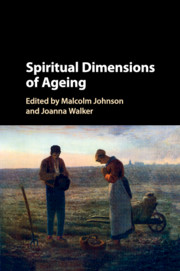Book contents
- Frontmatter
- Contents
- List of Contributors
- Preface
- Acknowledgements
- 1 Spirited Ageing
- Part I The Spiritual Journey of Ageing
- 2 Spirituality and Ageing: Yesterday, Today and Tomorrow
- 3 Ageing and Spirituality across Faiths and Cultures
- 4 Stages of the Soul and Spirituality in Later Life
- 5 Aesop's Fables as Spiritual Touchstones for Ageing
- Part II Cultures of the Spirit in Modernity
- Part III Searching for Meaning in Later Life
- Part IV Meeting Spiritual Needs in Older Age
- Index
- References
5 - Aesop's Fables as Spiritual Touchstones for Ageing
from Part I - The Spiritual Journey of Ageing
Published online by Cambridge University Press: 22 December 2016
- Frontmatter
- Contents
- List of Contributors
- Preface
- Acknowledgements
- 1 Spirited Ageing
- Part I The Spiritual Journey of Ageing
- 2 Spirituality and Ageing: Yesterday, Today and Tomorrow
- 3 Ageing and Spirituality across Faiths and Cultures
- 4 Stages of the Soul and Spirituality in Later Life
- 5 Aesop's Fables as Spiritual Touchstones for Ageing
- Part II Cultures of the Spirit in Modernity
- Part III Searching for Meaning in Later Life
- Part IV Meeting Spiritual Needs in Older Age
- Index
- References
Summary
“When I grew up, I had finished with childish things. Now we see only puzzling reflections in a mirror.”
I Corinthians 13: 11–12 (New English Bible)“Spirituality is an abstract, sensitizing concept that refers to a region of human experience involving awareness of being and transcending a purely personal, self-centered viewpoint,” writes Robert C. Atchley in Spirituality and Aging. “Spiritual experience begins with basic spirituality, an unadorned sense of being. To this is added a sense of ‘I’ as perceiver and actor” (Atchley, 2009, p. 147). Atchley rightly claims that spirituality manifests itself in the Present, where a receptive “I” embraces both Transcendence and Immanence. Spirituality entails at once all-encompassing and intimate relationships with Ultimate Reality. Experienced in one present moment after another, spiritually inclined persons learn how to balance being and doing. Seekers sustain quests for authentic identities while they go about their business in the world. “Spirituality as the transformation and discovery of the self always happens in encounter … an activity constantly stirred up and sustained by the other who calls one out of one's self and into the truth of one's mission in life, out of provisionality and into the adventure of incarnation” (McIntosh, 1998, p. 6).
Younger and older seekers usually share certain spiritual traits, such as a history of religiosity and encounters with loss. In most instances, however, spiritual development typically ripens during the second half of life (Clark, 2005). Women and men over forty are the prime consumers and producers of spiritual retreats, workshops, websites, and literature. Promoting spirituality has become big business: Amazon in 2012 offered 132,000 books on spiritual transformation, and 62,000 more under its New Age category. The passage of years nonetheless does not invariably engender spiritual enlightenment. “Developing this capacity is mysterious in that not everyone perceives or accepts the invitation to spiritual consciousness,” notes Atchley, acknowledging aging's diverse patterns. “Yet by later life, a large majority of people are in touch with their inner life and can identify elements of their lives that they perceive to be spiritual” (Atchley, 2009, p. 148).
Writers invoke a variety of metaphors to characterize the mysterious, elusive contours of spirituality and aging. One set, focusing on human actors, highlights “spiritual growth” and “self discovery,” emphasizing the “mature imagination” of “sages” or “spiritual elders” (Biggs, 1999; Koenig, 1994; Moberg and Ellor, 2001; Schachter-Shalomi and Miller, 1995).
- Type
- Chapter
- Information
- Spiritual Dimensions of Ageing , pp. 69 - 84Publisher: Cambridge University PressPrint publication year: 2016

